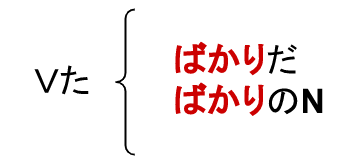
~たばかり (have just done)
Other meanings: just finished; something just occurred
Can be used to convey something just ended, something just started, etc.
The important thing to remember is that this structure conveys that not much time has passed since action V was done.
Conjugation
You only use the past tense of the verb, as the action has already happened.
When using ばかりのN, you are describing a situation or place or other noun where you just began doing ~.
For example: 日本語を習い始めたばかりの頃 means “the time when I just began learning Japanese.”
If you got rid of the の頃, the meaning would change to “I just began learning Japanese.”
Examples
日本語を習い始めたばかりの頃は、簡単なあいさつさえできなかった。
When I first started learning Japanese, I couldn’t even do a simple greeting.
今、始まったばかりです。
It just started now.
~たばかり (have just done)
Other meanings: just finished; something just occurred
Can be used to convey something just ended, something just started, etc.
The important thing to remember is that this structure conveys that not much time has passed since action V was done.
Conjugation
You only use the past tense of the verb, as the action has already happened.
When using ばかりのN, you are describing a situation or place or other noun where you just began doing ~.
For example: 日本語を習い始めたばかりの頃 means “the time when I just began learning Japanese.”
If you got rid of the の頃, the meaning would change to “I just began learning Japanese.”
Examples
日本語を習い始めたばかりの頃は、簡単なあいさつさえできなかった。
When I first started learning Japanese, I couldn’t even do a simple greeting.
今、始まったばかりです。
It just started now.
 Knowt
Knowt

